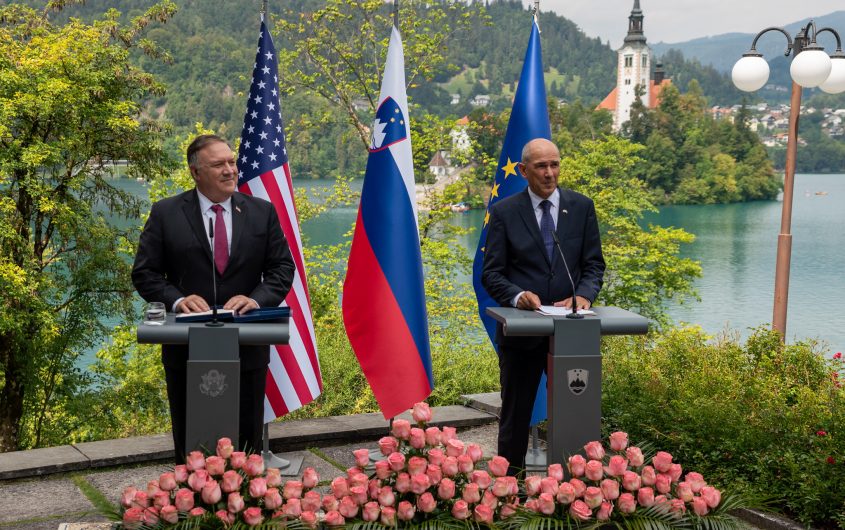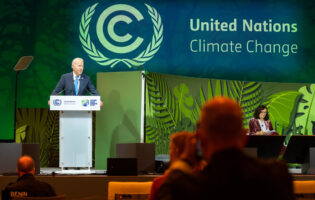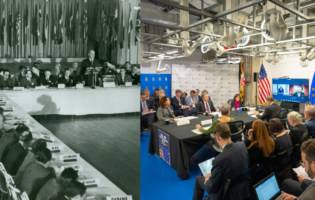
State Department photo by Ron Przysucha via Flickr
Winning Over Europe

Yixiang Xu
China Fellow; Program Officer, Geoeconomics
Yixiang Xu is the China Fellow and Program Officer, Geoeconomics at AGI, leading the Institute’s work on U.S. and German relations with China. He has written extensively on Sino-EU and Sino-German relations, transatlantic cooperation on China policy, Sino-U.S. great power competition, China's Belt-and-Road Initiative and its implications for Germany and the U.S., Chinese engagement in Central and Eastern Europe, foreign investment screening, EU and U.S. strategies for global infrastructure investment, 5G supply chain and infrastructure security, and the future of Artificial Intelligence. His written contributions have been published by institutes including The Chinese Academy of Social Sciences, The United States Institute of Peace, and The Asia Society's Center for U.S.-China Relations. He has spoken on China's role in transatlantic relations at various seminars and international conferences in China, Germany, and the U.S.
Mr. Xu received his MA in International Political Economy from The Josef Korbel School of International Studies at The University of Denver and his BA in Linguistics and Classics from The University of Pittsburgh. He is an alumnus of the Bucerius Summer School on Global Governance, the Global Bridges European-American Young Leaders Conference, and the Brussels Forum's Young Professionals Summit. Mr. Xu also studied in China, Germany, Israel, Italy, and the UK and speaks Mandarin Chinese, German, and Russian.
__
Chinese foreign minister Wang Yi began his European tour this week, with planned stops in Italy, the Netherlands, Norway, France, and Germany. China wants to recalibrate its ties with Europe after months of deteriorating bilateral relations resulting from Beijing’s handling of the coronavirus pandemic and the Chinese government’s crackdown in Hong Kong. The core of Wang’s mission is to reset the bilateral agenda to focus on economic issues such as the EU-China Comprehensive Agreement on Investment, global supply chains, and preventing manifest anti-China policies from taking hold in European capitals.
Sustained waves of visits by high-profile U.S. government officials to Europe in the past months added urgency to Beijing’s diplomatic outreach. In July, National Security Advisor Robert O’Brien and Deputy National Security Advisor Matthew Pottinger traveled to Paris for meetings with European officials on China. Earlier this month, U.S. Secretary of State Mike Pompeo toured central Europe to drum up support for the U.S. government’s hard line approach toward Beijing.
Washington’s anti-Huawei campaign in Europe has gained more ground recently as the Trump administration further tightened export restrictions on the Chinese telecommunications company, effectively cutting it off from most of the world’s semiconductors. And this is just one of the torrents of recent U.S. policies designed to punish and contain China. The U.S. government has also been increasingly vocal about building a global coalition against China. Pompeo announced on his July visit to the UK that the U.S. wants collective efforts from partners to counter the Chinese Communist Party’s (CCP) “disgraceful behavior.” The Sino-U.S. relationship may not have fully fledged into Cold War 2.0 yet, but Washington is insistently pushing countries to choose sides. Determined to avoid isolation, Beijing is launching a charm offensive, doubling down on economic incentives, and pledging to uphold multilateralism. Europe is the Grand Prix of this geopolitical contest.
Europe is the Grand Prix of this geopolitical contest.
But both China and the U.S. have found it difficult to win over Europe in a decisive, unambiguous way—and for good reason. Despite the Cold War rhetoric, the present Sino-U.S. confrontation is not an ideological contest and neither side can claim absolute moral high ground over their domestic and foreign policies. The Chinese government in the hands of the CCP remains Leninist at heart, but its embrace of capitalism has interwoven the country deep into the fabric of the global economy. The U.S. government claims to lead the charge against China’s democracy and human rights abuses, but the Trump administration’s handling of racial and immigration issues at home fails to inspire confidence.
In demanding that Europe follows U.S. policy on China, Washington did not bother to ingratiate itself with European allies. On the contrary, the Trump administration repeatedly picked fights with European partners. It threatened to impose auto tariffs and retaliate against digital taxes on American internet companies. President Trump ceaselessly denigrated European NATO allies, especially Germany, for not paying up and threatened the viability of the vital security alliance. Rather than renewing the transatlantic alliance with a China mandate, the resulting sense of American unreliability has pushed European leaders to embrace strategic autonomy.
China’s golden hue as a strategic partner for Europe has also faded. Unrealized pledges from Beijing to carry out all kinds of reforms, from granting European businesses greater reciprocity to combating climate change, has led to a promise fatigue. Instead of reassuring Europe of China’s commitment to open and fair global free trade, Chinese plans to dominate crucial and emerging technologies, such as the Made In China 2025 and China Standards 2035, have raised further alarms about Beijing’s industrial policy. China’s aggressive wolf diplomacy against any criticism toward its conduct only reinforces the Sino-European ideological trench on values and limitations of the partnership.
It is hard to imagine that Europe would want to heed U.S. hawks’ call to reverse China’s integration into the global economy. There is simply too much economic interest at stake. At the same time, it would be equally improbable for Europe to continue engaging China on Chinese terms. Many European countries have resisted choosing sides in the Sino-U.S. confrontation but grew increasingly articulate in their positions on issues of national interest.
Europe’s internal division on China policy often cuts across the oversimplified rich/poor or center/periphery divide.
The diverse array of varying national interests toward China and the U.S. among European countries makes the task of winning over Europe even harder. While Slovenia signed a joint declaration supporting Pompeo’s “Clean Network” campaign during his central Europe tour, Czech prime minister Andrej Babiš made it clear that he wants more investment from China. Whereas Germany continues to prioritize its economic ties with China, Sweden called for EU sanctions for China’s implementation of the new national security law in Hong Kong. Europe’s internal division on China policy often cuts across the oversimplified rich/poor or center/periphery divide. Until the bloc unites behind a common position, neither the U.S. nor China can claim victory on the geopolitical turf war.
Perhaps more importantly, Beijing and Washington need to recognize that Europe doesn’t consent to being fought over. Europe wants to shape its own choices. The European Commission has taken steps to form EU policy whose effects could reach beyond Europe. In June, the Commission adopted a White Paper on foreign subsidies in the Single Market to more rigorously police distortions caused by foreign subsidies granted by non-EU countries, which could see overseas Chinese companies coming under increased scrutiny. And European Commission executive vice president Margrethe Vestager recently pledged to push ahead with a regional digital services tax if the U.S. continues to block global consensus. These and other similar policy initiatives demonstrate that Europe takes its newly found strategic autonomy seriously and, going forward, winning over Europe would also have to be on Europe’s terms.








